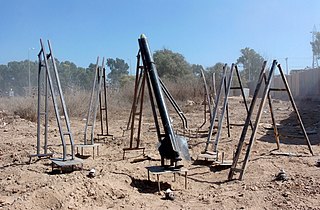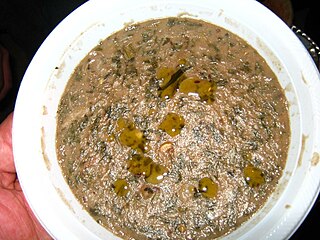 W
WThe al-Quds 101 Rocket is a homemade rocket made and used by the Palestinian Islamic Jihad for use in attacks against Israel. The al-Quds 101 is most likely similar to the Qassam rocket series used by Hamas.
 W
WThe Carlo is an improvised submachine gun manufactured by small workshops in the Palestinian Territories. The design has been inspired by the Swedish Carl Gustav m/45 and its Egyptian Port Said variant, however the similarity is often only passing. The Carlo's homemade nature makes it affordable on the black market, where it is purchased not only by Palestinian terrorists targeting Israelis, but also by Arab-Israeli gangs. The Carlo is cheap and requires little skill or equipment to manufacture, but it's inaccurate and prone to jamming and misfire. The weapon is named after the Carl Gustaf m/45.
 W
WHebron Glass refers to glass produced in Hebron as part of a flourishing art industry established in the city during Roman rule in Palestine. The Old City of Hebron still contains a quarter named the "Glass-Blower Quarter" and Hebron glass continues to serve as a tourist attraction for the city.
 W
WThe Palestinian keffiyeh is a chequered black and white scarf that is usually worn around the neck or head. This keffiyeh has become a symbol of Palestinian nationalism, dating back to the 1936–1939 Arab revolt in Palestine. Outside of the Middle East and North Africa, the keffiyeh first gained popularity among activists supporting the Palestinians in the conflict with Israel and is an icon of Palestinian solidarity.
 W
WMother-of-pearl carving is a traditional handicraft in Bethlehem, and is said to have been brought to the city by Franciscan friars from Italy in the 15th century.
 W
WMusakhan is a Palestinian Arab cuisine dish, composed of roasted chicken baked with onions, sumac, allspice, saffron, and fried pine nuts served over taboon bread. It is also known as muhammar. It is often considered the national dish of Palestine. It also remains a very popular dish within the Arab triangle, areas near Iksal and Sandala villages, and Israeli Druze and Israeli Arabs in North Israel. It originated in the Tulkarm and Jenin area.
 W
WNabulsi is one of a number of Palestinian white brined cheeses made in the Middle East. Its name refers to its place of origin, Nablus, and it is well known throughout the West Bank and surrounding regions. Nabulsi, along with Akkawi cheese, is one of the principal cheeses consumed in Jordan. It is produced primarily from sheep milk; alternatively, goat's milk may be used. Nabulsi cheese is white and rectangular in shape. It is semi-hard with no gas holes. It becomes soft and elastic when heated. It is a typical ewe's or goat's milk cheese, but is traditionally flavored with mahleb and mastic added to the boiling brine. It can be eaten fresh as salty table cheese or can be fried in oil, and it is also a major ingredient of the Palestinian dessert knafeh.
 W
WNabulsi soap is a type of castile soap produced only in Nablus in the West Bank, Palestine. Its chief ingredients are virgin olive oil, water, and an alkaline sodium compound. The finished product is ivory-colored and has almost no scent. Traditionally made by women for household use, it had become a significant industry for Nablus by the 14th century. In 1907 the city's 30 Nabulsi soap factories were supplying half the soap in Palestine. The industry declined during the mid-20th century following the destruction caused by the 1927 Jericho earthquake and later disruption from the Israeli military occupation. As of 2008, only two soap factories survive in Nablus. The old Arafat soap factory has been turned into a Cultural Heritage Enrichment Center.
 W
WOlive wood carving is an ancient tradition in Palestine that continues to the present day. It involves the skillful chiseling of olive wood and is most common in the Bethlehem region.
 W
WThe Qassam rocket is a simple, steel artillery rocket developed and deployed by the Izz ad-Din al-Qassam Brigades, the military arm of Hamas. These rockets cannot be fired to target specific military objectives in or near civilian areas, and are "indiscriminate when used against targets in population centers".
 W
WSumaghiyyeh is a Palestinian dish native to Gaza City, prepared traditionally on holidays. It receives its name from the spice sumac.